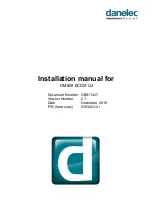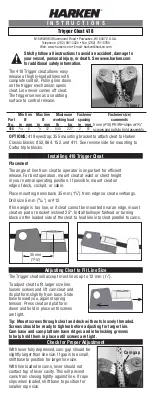
10
Section 3b
– OPERATION
Pool Water Preparation
Salt Requirements
It is important that with typical pools, a salt residual of 2.8 – 3.2 gm/l (2800 to 3200 ppm) be maintained at all times for peak
efficiency.
NOTE:
Maintaining high salt levels above recommended range can contribute to corrosion of pool/spa equipment. Salt levels
exceeding the recommended concentration can be reduced by diluting the pool/spa with fresh water.
The amount of salt required depends on the size of the pool and the present salt level. Broadcast the salt around the perimeter
of the pool. DO NOT add salt directly into any skimmer or gutter device. As the salt is being added, we recommend running
the circulation pump continually for 24 hours with the main drain opened. Brushing the salt towards the bottom main drain
will assist in the dissolve rate and prevent possible staining with certain types of salt.
We recommend the use of a specialty blended salt product that does not contain Yellow
Prussiate of Soda (YPS) or Iodine which could cause a localized tint to the water or brown staining on the cementitious finish if
allowed to rest undissolved on the finish for extended periods of time. Lectra Clor Plus is blended with the proper amount of
stabilizer to maintain a proper level within the recommended range when added according to the salt chart or the box.
Granular Salt, Table Salt, Solar Salt or Water Conditioner Pellets can also be used but will have different dissolve rates. If the
salt you use contains Iodine or YPS, constant brushing may help the dissolve rate and minimize staining due to the additives in
the salt. Ensure that ANY salt you use contains a minimum purity of 99% Sodium Chloride (NaCl).
NOTE: Do not use Rock Salt due to its high levels of impurities.
TEST YOUR WATER FOR SALT LEVEL FIRST
with the provided salt test strips,
and then use the chart below to determine the amount of salt to add.
SALT REQUIREMENT CHART
KILOS (LBS.) OF SALT NEEDED FOR 3000 PPM RESIDUAL
Pool Volume in Liters (US Gallons
)
SALT Level
Before Addition
3,780
(1,000)
9,430
(2,500)
18,900
(5,000)
28,300
(7,000)
37,780
(10,000)
56,700
(15,000)
75,600
(20,000)
113,600
(30,000)
0 ppm
11.3 (25)
28 (63)
57 (126)
85 (175)
113 (252)
175 (378)
227 (504)
340 (756)
500 ppm
9.5 (21)
24 (53)
48 (106)
73 (147)
95 (212)
145 (318)
191 (424)
286 (636)
750 ppm
8.6 (19)
22 (48)
43 (96)
66 (133)
86 (192)
130 (288)
173 (384)
259 (576)
1000 ppm
7.7 (17)
19 (43)
39 (86)
54 (119)
77 (172)
116 (258)
155 (344)
232 (516)
1500 ppm
5.9 (13)
15 (33)
30 (66)
41 (91)
59 (132)
89 (198)
119 (264)
178 (396)
2000 ppm
3.6 (8)
9.5 (21)
19 (42)
30 (56)
38 (84)
57 (126)
76 (168)
113 (252)
2250 ppm
2.7 (6)
7 (15)
14 (30)
19 (42)
28 (60)
41 (90)
54 (120)
81 (180)
Note:
The above chart is based on 120 grams of salt added to 1000 Liters of water (1 lb. per 1,000 gallons) to increase your salt
residual 120-ppm.
Start Up Procedures
Keep the Output Setting on your Pool Pilot Digital on 0% (OFF) until you get your water clear, blue and properly balanced.
1. After balancing your water chemistry according to the Water Chemistry Parameters shown on page 10, add the proper
amount of salt (see Salt Requirement Chart above) and circulate 24-hours prior to starting your Pool Pilot Digital.
2. The following day set your Output Level to 50% and operate normally . Test water as required to conform with local
health code. Raise or lower output control setting as needed.
3. Once your Output Level has been established, you will only need to adjust your level according to increased bather usage.





































